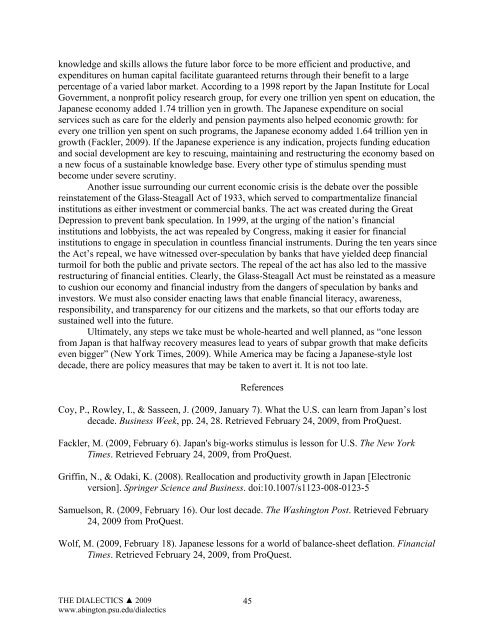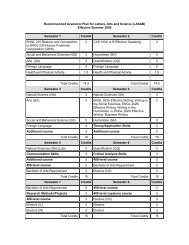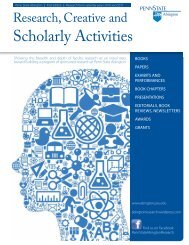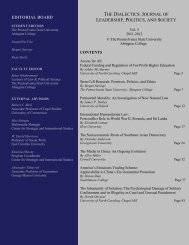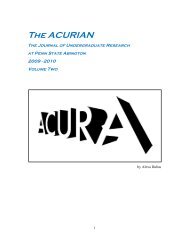Vol. III - Penn State Abington
Vol. III - Penn State Abington
Vol. III - Penn State Abington
You also want an ePaper? Increase the reach of your titles
YUMPU automatically turns print PDFs into web optimized ePapers that Google loves.
knowledge and skills allows the future labor force to be more efficient and productive, and<br />
expenditures on human capital facilitate guaranteed returns through their benefit to a large<br />
percentage of a varied labor market. According to a 1998 report by the Japan Institute for Local<br />
Government, a nonprofit policy research group, for every one trillion yen spent on education, the<br />
Japanese economy added 1.74 trillion yen in growth. The Japanese expenditure on social<br />
services such as care for the elderly and pension payments also helped economic growth: for<br />
every one trillion yen spent on such programs, the Japanese economy added 1.64 trillion yen in<br />
growth (Fackler, 2009). If the Japanese experience is any indication, projects funding education<br />
and social development are key to rescuing, maintaining and restructuring the economy based on<br />
a new focus of a sustainable knowledge base. Every other type of stimulus spending must<br />
become under severe scrutiny.<br />
Another issue surrounding our current economic crisis is the debate over the possible<br />
reinstatement of the Glass-Steagall Act of 1933, which served to compartmentalize financial<br />
institutions as either investment or commercial banks. The act was created during the Great<br />
Depression to prevent bank speculation. In 1999, at the urging of the nation’s financial<br />
institutions and lobbyists, the act was repealed by Congress, making it easier for financial<br />
institutions to engage in speculation in countless financial instruments. During the ten years since<br />
the Act’s repeal, we have witnessed over-speculation by banks that have yielded deep financial<br />
turmoil for both the public and private sectors. The repeal of the act has also led to the massive<br />
restructuring of financial entities. Clearly, the Glass-Steagall Act must be reinstated as a measure<br />
to cushion our economy and financial industry from the dangers of speculation by banks and<br />
investors. We must also consider enacting laws that enable financial literacy, awareness,<br />
responsibility, and transparency for our citizens and the markets, so that our efforts today are<br />
sustained well into the future.<br />
Ultimately, any steps we take must be whole-hearted and well planned, as “one lesson<br />
from Japan is that halfway recovery measures lead to years of subpar growth that make deficits<br />
even bigger” (New York Times, 2009). While America may be facing a Japanese-style lost<br />
decade, there are policy measures that may be taken to avert it. It is not too late.<br />
References<br />
Coy, P., Rowley, I., & Sasseen, J. (2009, January 7). What the U.S. can learn from Japan’s lost<br />
decade. Business Week, pp. 24, 28. Retrieved February 24, 2009, from ProQuest.<br />
Fackler, M. (2009, February 6). Japan's big-works stimulus is lesson for U.S. The New York<br />
Times. Retrieved February 24, 2009, from ProQuest.<br />
Griffin, N., & Odaki, K. (2008). Reallocation and productivity growth in Japan [Electronic<br />
version]. Springer Science and Business. doi:10.1007/s1123-008-0123-5<br />
Samuelson, R. (2009, February 16). Our lost decade. The Washington Post. Retrieved February<br />
24, 2009 from ProQuest.<br />
Wolf, M. (2009, February 18). Japanese lessons for a world of balance-sheet deflation. Financial<br />
Times. Retrieved February 24, 2009, from ProQuest.<br />
THE DIALECTICS ▲ 2009<br />
www.abington.psu.edu/dialectics<br />
45


